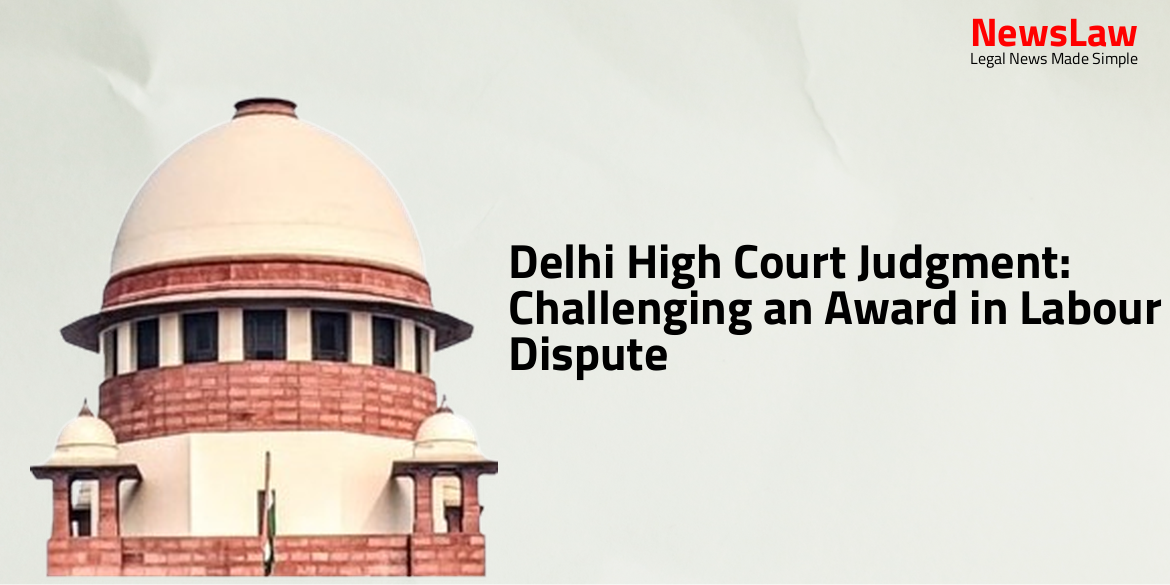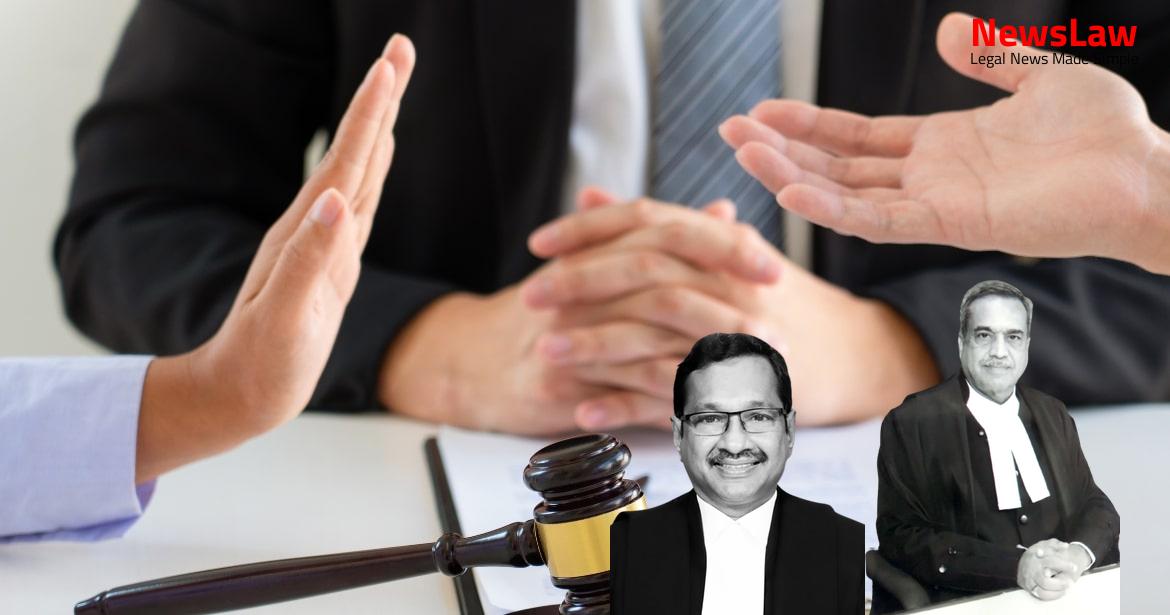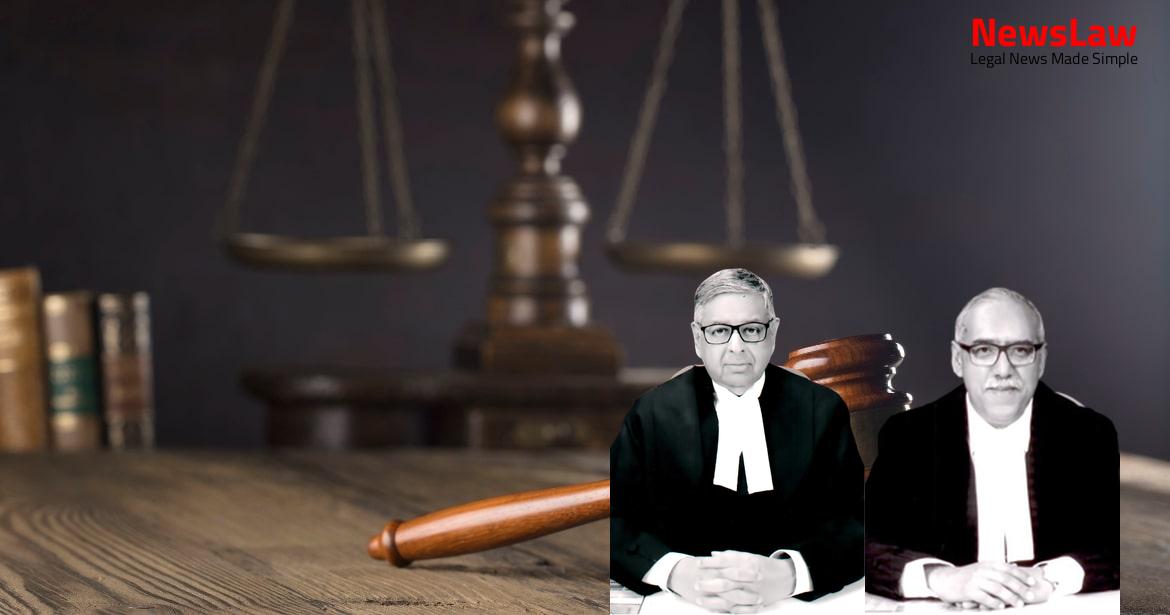The Delhi High Court recently delivered a significant judgement in a case involving a labour dispute. The petitioner corporation challenged an award passed by the Labour Court, alleging errors in the standard of proof applied. The case revolves around the punishment imposed on the respondent workman by the Depot Manager and the subsequent legal challenges. Stay tuned to learn more about the court’s decision and its implications in this complex legal matter.
Facts
- The application for early hearing of the writ petition has been disposed of.
- The application was filed seeking an early hearing of the writ petition.
- The application was allowed for sufficient cause shown and the matter is taken up for hearing in the regular category.
Arguments
- The petitioner corporation challenges the impugned award passed by the Labour Court, alleging that it was erroneous and illegal as it set aside the punishment imposed on the respondent workman by the Depot Manager.
- The petitioner argues that the standard of proof in criminal proceedings is stricter (beyond reasonable doubt), while in civil disputes, it is preponderance of probabilities.
- The petitioner claims that the Labour Court erred in not considering the death of the cyclist due to the negligence of the respondent workman.
- It is contended that the burden of proof regarding the negligent driving of the bus was on the respondent workman, which he failed to discharge by not presenting evidence or cross-examining witnesses.
- The petitioner asserts that the Labour Court wrongly relied on the outcome of a criminal trial in passing the impugned award, as departmental proceedings have a different standard of proof.
- Lastly, the petitioner argues that the respondent workman was falsely accused in the criminal proceedings, and the Labour Court rightly set aside the punishment imposed due to an improper enquiry.
- The respondent workman’s counsel refuted the petitioner’s submissions, claiming no illegality in the impugned award.
- The respondent workman was not proven to be driving negligently as no eyewitnesses were produced by the petitioner corporation.
- There were no other complaints about the alleged accident, strengthening the respondent’s position.
- The Labour Court accurately assessed the facts and circumstances, leading to the setting aside of the punishment imposed by the Depot manager.
Analysis
- The doctrine of res ipsa loquitur is applicable to the case of the respondent workman who was involved in a negligent act resulting in an accident.
- The nature of evidence required in a criminal trial is different from that in departmental proceedings.
- The punishment imposed by the management on the workman was deemed illegal and unjustified based on findings of a vitiated enquiry.
- The standard of proof and rules of evidence are distinct in criminal and departmental proceedings.
- The responsibility of proving misconduct lies with the management in departmental enquiries.
- Admissions by management witnesses that they were not present during the incident do not invalidate the enquiry proceedings.
- Prompt conclusion of disciplinary proceedings is crucial for maintaining efficiency in public administration.
- Exoneration in criminal proceedings does not automatically exonerate a workman from punishment in a domestic enquiry.
- The evidence and standard of proof in departmental inquiries differ from criminal trials.
- The purpose of departmental enquiries is to maintain discipline and efficiency in public service.
- Staying of disciplinary proceedings pending criminal cases should not be routine but a carefully considered decision.
- The punishment imposed on the workman was considered adequate due to the negligent act that led to the accident.
- It is not in the interest of administration to keep individuals accused of serious misconduct in office for prolonged periods awaiting criminal case outcomes.
- In disciplinary proceedings, the key question is whether the employee is guilty of conduct warranting action, whereas in criminal proceedings the focus is on establishing the offense and determining the appropriate sentence.
- Disciplinary proceedings do not require the technical rules of evidence or proof beyond reasonable doubt, but rely on preponderance of probabilities and evidence on record to ascertain misconduct.
- Acquittal in criminal proceedings does not prevent holding the accused guilty of misconduct in departmental proceedings due to the lower threshold of proof required.
- The doctrine of res ipsa loquitur applies when facts clearly indicate negligence, shifting the burden of proof to the accused to show otherwise.
- Enquiry proceedings and criminal trials have distinct standards of proof and procedures, with departmental enquiries conducted according to service rules rather than statutory evidence provisions.
- Failure to produce independent witnesses does not invalidate disciplinary findings, and the burden to prove the accident occurred due to causes other than the driver’s negligence lies with the employee.
- Proper inference from known circumstances can establish negligence, and in cases where the accident speaks for itself, the maxim res ipsa loquitur applies.
- Proceedings must be expeditious, with departmental enquiries conducted based on preponderance of probability rather than proof beyond reasonable doubt.
- The Court has decided to utilize its extraordinary writ jurisdiction under Article 226 of the Constitution of India.
- The Labour Court erred in applying the incorrect standard of proof for a domestic enquiry, using the criminal trial standard instead of preponderance of probability.
- This error justifies judicial review of the case.
Decision
- The captioned writ petition has been disposed of along with any pending applications.
- The judgement is concluded for the specified part (RPC).
Case Title: M/S D.T.C. Vs. RAJINDER SINGH, DRIVER (2024:DHC:4200)
Case Number: W.P.(C)-17665/2005



